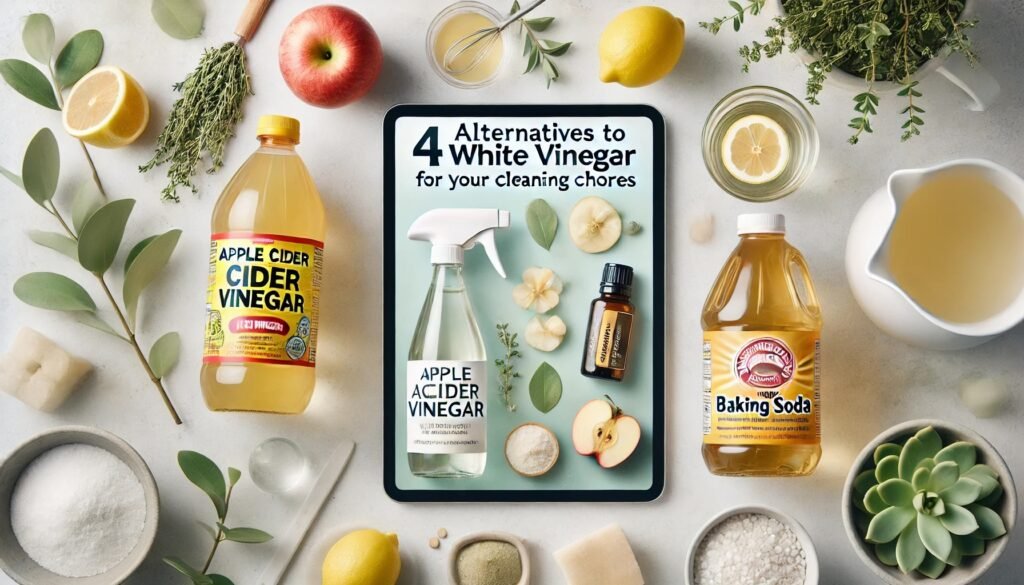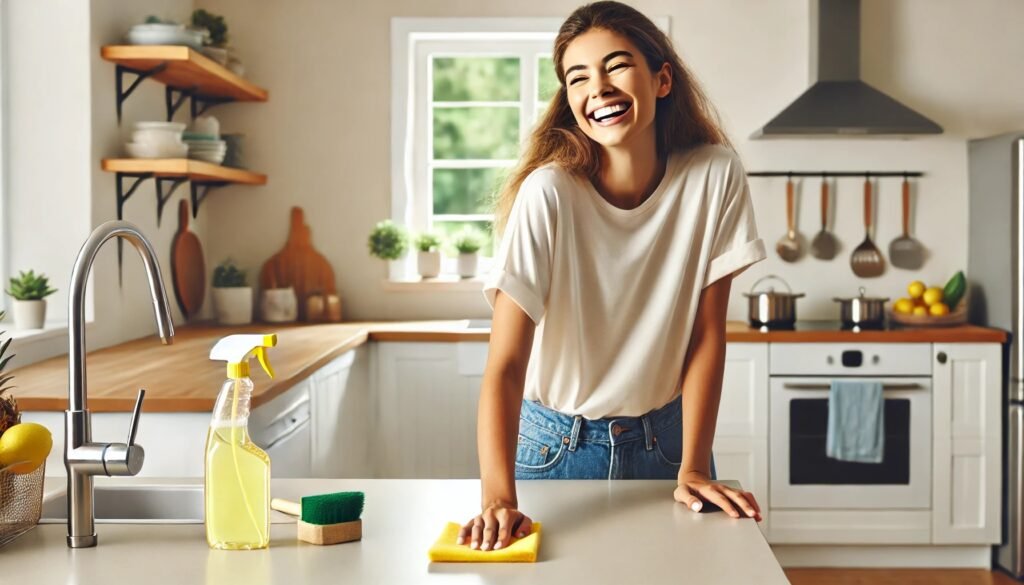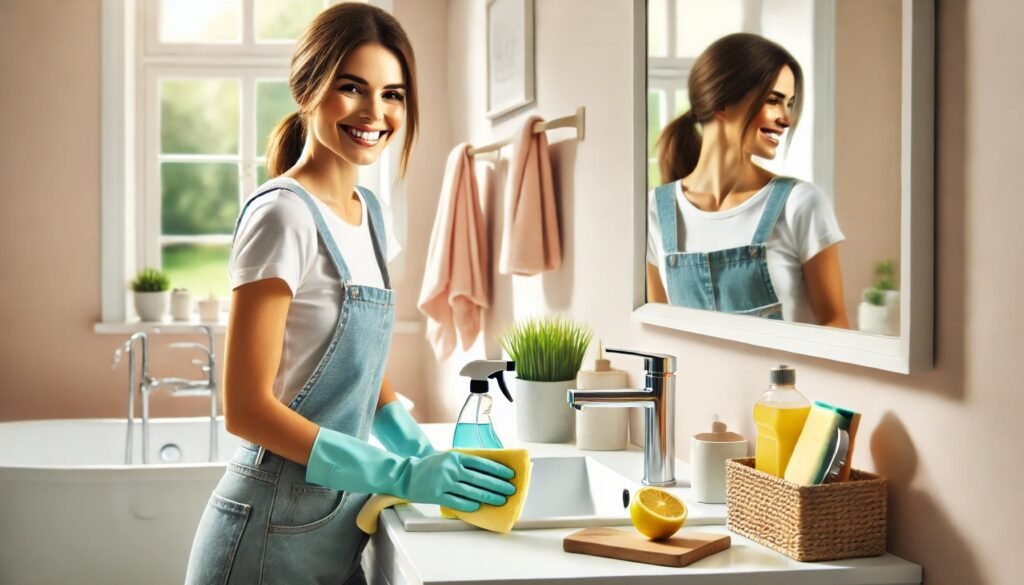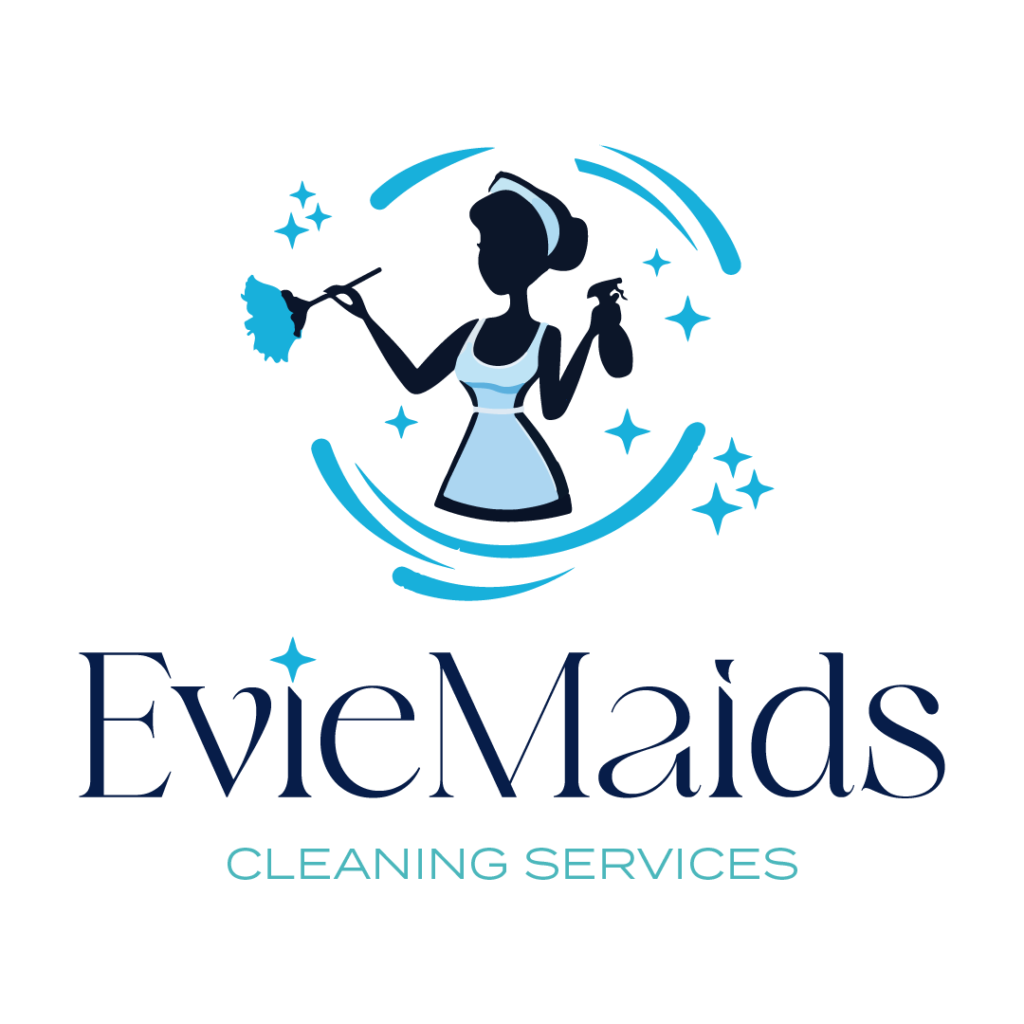Why Try Alternatives to White Vinegar for Cleaning?
White vinegar is a popular cleaner. It’s natural and great at cutting through grime and killing bacteria. However, the strong smell can be unpleasant, and its high acidity can damage certain surfaces like marble or granite. Some people also prefer alternatives for a fresher scent or because they are out of vinegar. If any of these issues apply to you, here are 4 alternatives to white vinegar for your cleaning chores.
Alternative 1: Apple Cider Vinegar
Why Use Apple Cider Vinegar?
Apple cider vinegar is similar to white vinegar in acidity, but it has a milder smell. This makes it a good choice if you want a vinegar-based cleaner without the strong odor. Apple cider vinegar can be used for most of the same cleaning chores as white vinegar.
- Better Homes & Gardens – Uses for Vinegar: More tips on using different types of vinegar around the house.
How to Use Apple Cider Vinegar for Cleaning
- It works well for cleaning mirrors, windows, and tiles. It can also help with odor control, especially in drains and garbage disposals.
- Be careful with apple cider vinegar on white fabrics and light-colored surfaces. Its natural amber color might stain.

Important Notes
Like white vinegar, apple cider vinegar shouldn’t be used on stone surfaces like granite or marble, as it can cause damage over time.
Alternative 2: Lemon Juice
Why Choose Lemon Juice?
Lemon juice has citric acid, which is great for killing germs and removing stains. It also has a fresh scent, making it a good choice for kitchens and bathrooms where a pleasant smell is a bonus.
- NCBI – Lemon as a Cleaner: Check out studies on lemon’s antibacterial properties.
Best Ways to Use Lemon Juice for Cleaning
- Lemon juice works well on metal surfaces, like faucets, where it helps dissolve limescale. It’s also ideal for sanitizing cutting boards and can even freshen up a microwave by heating a bowl of water with lemon juice for a few minutes.

What to Avoid
Lemon juice can damage surfaces like marble and granite, so use it only on surfaces that can handle acidic cleaners.
Alternative 3: Baking Soda
How Baking Soda Works as a Cleaner
Baking soda is an effective cleaner that’s also very gentle. Since it’s alkaline, it’s safe for surfaces where acidic cleaners like vinegar might cause damage. It’s excellent at scrubbing dirt and absorbing bad smells.
- The Spruce – Cleaning with Baking Soda: Learn how baking soda can be used in various cleaning tasks.
How to Use Baking Soda in Your Cleaning Chores
- Baking soda can be made into a paste with a bit of water. This paste works well for scrubbing sinks, stovetops, and countertops.
- It’s also great for freshening up carpets. Just sprinkle a bit, let it sit, and then vacuum. You can even add a few drops of essential oil for a nice scent.
Things to Keep in Mind
Baking soda can be too abrasive for shiny or delicate surfaces. Always rinse thoroughly to avoid leaving a powdery residue.
Alternative 4: Essential Oils for a Fresh, Natural Clean
Why Use Essential Oils Instead of Vinegar?
Essential oils, like tea tree, lemon, or lavender oil, have natural properties that can help clean and deodorize your home. They’re also popular for their pleasant scents and can make your cleaning routine feel more enjoyable. Certain essential oils, like tea tree oil, also have antibacterial effects, which makes them great for cleaning.
- Statistic: According to a study published in Molecules, essential oils like tea tree oil have strong antibacterial properties, killing up to 90% of certain bacteria on surfaces .
- Healthline – Safe Use of Essential Oils explains more about which oils are best for cleaning.
Ways to Use Essential Oils for Cleaning Chores
- Dilute with Water: Mix a few drops of essential oil with water in a spray bottle. This makes a mild spray for countertops, tables, and other hard surfaces.
- Combine with Baking Soda: Adding a few drops of essential oil to baking soda makes a great odor-absorbing scrub. This works well in sinks, garbage cans, and bathrooms.
Precautions When Using Essential Oils
Essential oils are strong, so always use them sparingly and dilute them with water or baking soda. Test on a small area first to ensure they won’t damage the surface or cause an allergic reaction.
Comparison of White Vinegar Alternatives: Which One Should You Use?
Each of these alternatives to white vinegar offers different benefits and is best suited for specific cleaning chores.
Here’s a quick comparison to help you choose the best option for each job:
| Alternative | Best For | Precautions |
| Apple Cider Vinegar | Odor removal, glass cleaning | May stain light surfaces |
| Lemon Juice | Sanitizing, fresh scent | Avoid on stone surfaces |
| Baking Soda | Scrubbing, odor removal | Rinse well to avoid residues |
| Essential Oils | Fresh scent, mild cleaning | Dilute and test for allergies |

- Statistic: Studies show that 68% of people prefer natural cleaners over chemical ones due to concerns about household safety and environmental impact (Source: EPA Survey, 2021).
- Analogy: Think of these alternatives like tools in a toolbox. Just as a hammer is best for nails and a screwdriver for screws, each cleaning alternative has its own “specialty” and should be chosen depending on the cleaning task at hand.
Frequently Asked Questions (FAQ)
- What is the best substitute for white vinegar in cleaning?
- Lemon juice and essential oils work well if you want a fresh smell. Baking soda is ideal for scrubbing.
- Can I use baking soda instead of vinegar?
- Yes, especially on surfaces that vinegar might damage. Baking soda is mild and effective for many cleaning chores.
- The Spruce – Baking Soda for Cleaning has more tips on baking soda cleaning uses.
- Does apple cider vinegar work as well as white vinegar?
- Apple cider vinegar works similarly but may stain lighter surfaces due to its color.
- Are essential oils safe for cleaning?
- Essential oils are safe if diluted properly. Tea tree oil, in particular, is great for disinfecting. Always test in a small area to avoid any surprises.

Conclusion: Choose the Right Vinegar Alternative for Your Cleaning Needs
Each of these 4 alternatives to white vinegar for your cleaning chores offers unique benefits. Whether you need a fresh-smelling cleaner, a mild scrub, or a safe option for sensitive surfaces, these choices give you flexibility in your cleaning routine.
Experiment with these options to find what works best for your home. For more guidance on natural cleaning options, refer to reliable sources like the EPA – Green Cleaning Products and Healthline – Safe Cleaning Tips.




